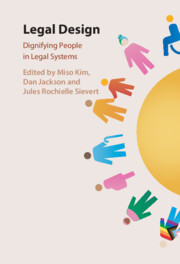Book contents
- Legal Design
- Legal Design
- Copyright page
- Dedication
- Contents
- Figures and Tables
- Contributors
- Foreword
- Acknowledgments
- Introduction
- I Why Legal Design
- II What Legal Design Can Do
- 4 Dignity in the Courtroom
- 5 Contracts for Dignity
- 6 Dignifying the Experience of Domestic Violence Survivors Seeking Legal Services
- 7 More Than a Building
- 8 Movement Lawyering
- 9 Deploying Art and Design to Highlight the Dignity of Domestic Workers in Their Struggle for Labor Rights
- 10 The Massachusetts Commission on LGBTQ Youth
- 11 My Mainway
- III How Legal Design Works
- IV Where Legal Design Goes
- Conclusion
- Index
- References
7 - More Than a Building
The Architecture of Fairness and Dignity
from II - What Legal Design Can Do
Published online by Cambridge University Press: 19 December 2024
- Legal Design
- Legal Design
- Copyright page
- Dedication
- Contents
- Figures and Tables
- Contributors
- Foreword
- Acknowledgments
- Introduction
- I Why Legal Design
- II What Legal Design Can Do
- 4 Dignity in the Courtroom
- 5 Contracts for Dignity
- 6 Dignifying the Experience of Domestic Violence Survivors Seeking Legal Services
- 7 More Than a Building
- 8 Movement Lawyering
- 9 Deploying Art and Design to Highlight the Dignity of Domestic Workers in Their Struggle for Labor Rights
- 10 The Massachusetts Commission on LGBTQ Youth
- 11 My Mainway
- III How Legal Design Works
- IV Where Legal Design Goes
- Conclusion
- Index
- References
Summary
Design is integral to every part of our justice system: from the built spaces like courtrooms and the clerk’s office counter, to the paper and digital forms litigants submit, to the rules of procedure themselves. This chapter argues that good architectural design can make our justice system more just by enhancing participants’ sense of fairness and dignity, and more efficient by contributing to mindsets from which it is easier for parties to resolve conflict. We begin by discussing historical inspirations and manifestations of courtroom and courthouse design. We then look at some of the key stakeholders who make design decisions before highlighting a few modern efforts to use design to bring dignity to patrons of courthouses. We illustrate our position by referencing a 2018 collaboration among a graduate architecture studio course at Wentworth Institute of Technology, Northeastern University School of Law’s NuLawLab, and Massachusetts Housing Court in which architecture and law students and faculty tackled spatial interventions in Boston Housing Court.
- Type
- Chapter
- Information
- Legal DesignDignifying People in Legal Systems, pp. 104 - 117Publisher: Cambridge University PressPrint publication year: 2024

